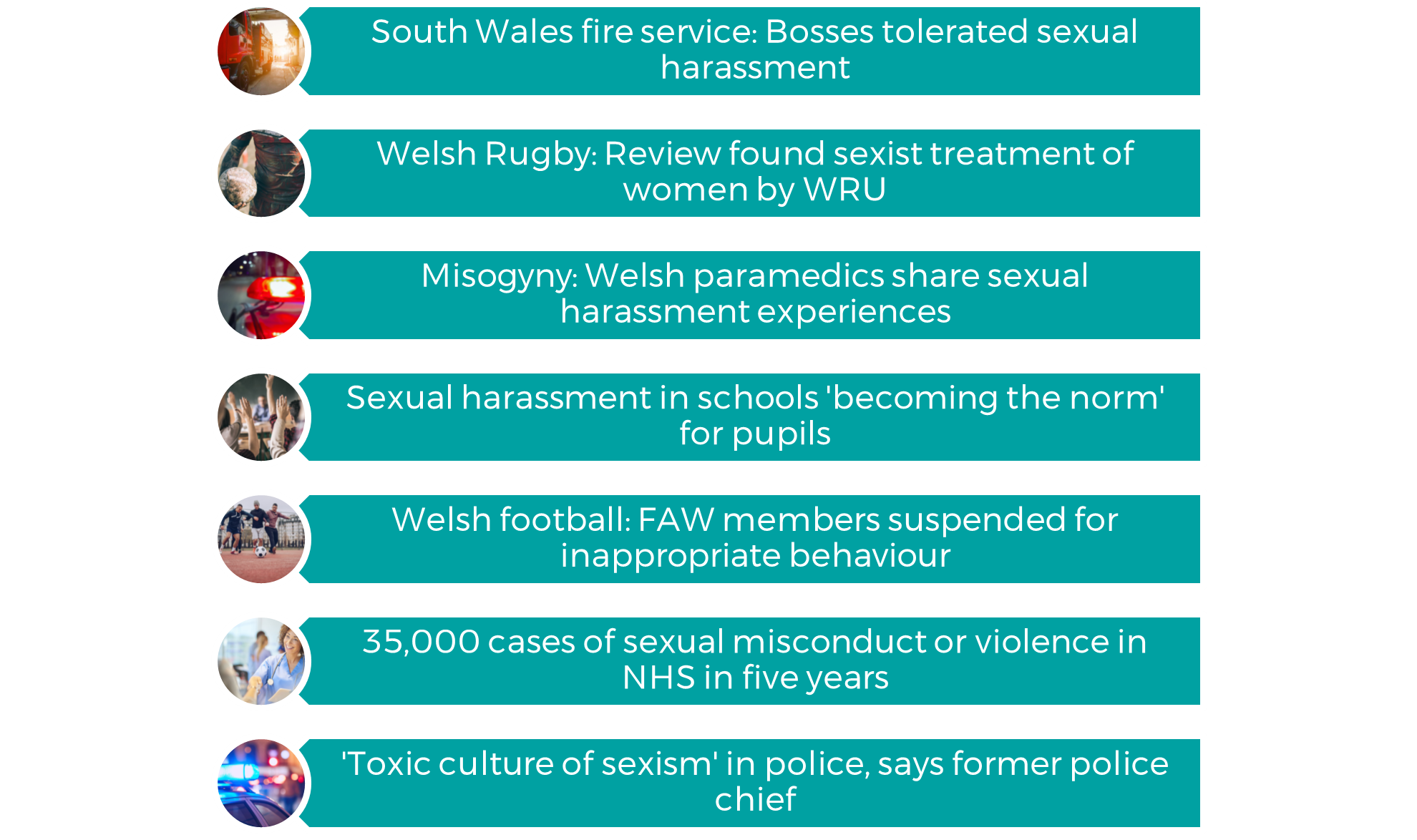It is an appalling fact that violence against women and girls continues to blight lives, with harassment, abuse and violence a daily occurrence for many. It is shocking that on average two women a week are killed by a current or former partner in England and Wales.
[Jane Hutt MS, Minister for Social Justice]
Violence against women and girls is a persistent issue that exists worldwide, including in Wales.
Estimates published by the World Health Organisation (WHO) indicate that globally around 1 in 3 (30%) women worldwide have been subjected to either physical and/or sexual violence in their lifetime.
In the year ending March 2020, the Crime Survey for England and Wales estimated 1.6 million women aged 16 to 74 years in England and Wales experienced domestic abuse, around 7% of the female population. It also estimated that 3% of women aged 16 to 74 years in England and Wales experienced sexual assault (including attempts) and 5% experienced stalking.
The WHO say “violence against women – particularly intimate partner violence and sexual violence – is a major public health problem and a violation of women's human rights”.
Challenges in Wales: harassment, sexism, and misogyny
Wales has not been immune to incidents of harassment, sexism and misogyny and cases have been reported across various sectors and industries. The extent of this becomes clear when you consider the following media headlines:

New report describes violence against women as endemic
In recent years, increased awareness and societal movements, such as #MeToo, have encouraged individuals to come forward and share their experiences, shedding light on the extent of the problem. This has led to a greater recognition of the need for preventative measures, support for survivors, and accountability for perpetrators.
Last week, the Senedd’s Equality and Social Justice Committee published a report setting out how “the epidemic in gender-based violence” can be prevented.
The report uses the term gender-based violence, which it says encompasses sexual harassment, sexism, and misogyny, as well as other forms of gendered violence such as, domestic abuse, sexual violence, stalking, forced marriage, sexual exploitation, and honour-based violence.
It describes gender-based violence as an epidemic - the issue is widespread, deeply ingrained, and pervasive. It follows that the scandals related to sexual harassment, sexism, and misogyny in various organisations in Wales and beyond, are not just isolated incidents. Rather a systemic and recurrent problem that is deeply rooted in the culture or structures of society.
The report says addressing the problem requires more than just dealing with individual cases; it necessitates comprehensive cultural and systemic changes to create an environment where harassment is not tolerated, and where prevention and accountability are prioritised. It states “gender-based violence cannot be prevented unless we confront gender inequality”.
The Committee worked with survivors who shared their stories and prompted a wider discourse on systemic issues. Members of the Committee’s advisory group met with Members in two separate private sessions at the Senedd. The group will meet once more to consider the Welsh Government’s response to its report.
Welsh Government promises to make Wales the safest place to be woman
The opening statement in the Welsh Government’s 2022-2026 strategy on Violence against women, domestic abuse, and sexual violence is a pledge to establish Wales as the safest place for women. The Minister says:
Women and men can be affected by VAWDASV but men form the vast bulk of perpetrators. It is clear that the biggest difference we can make is to tackle male violence. Women’s safety will not come from changing women’s behaviour it will come from changing the culture that fails to tackle toxic masculinity.
The strategy acknowledges that gender-based violence is a societal issue necessitating a collective response. The Minister asserts that the Welsh Government will both lead and drive this response.
A key focus of the Welsh Government has been the role of men and boys in addressing violence against women and girls. Also a key theme in the Equality and Social Justice Committee’s report.
Leading academic, Dr Stephen Burrell of Durham University said that governments should target men and boys in preventing violence against women to address root causes:
Ultimately, this violence is founded in, and plays a significant role in reproducing gender inequalities in which women’s lives are valued less and men are encouraged to expect to have more power.
Launched in July 2023, the Welsh Government’s Sound campaign aims to equip young men with the knowledge and confidence to reflect and understand their own behaviours, while also having open and honest conversations with their friends about theirs.
|
The Sound campaign has three simple calls to action: Sound it out. Encourage men to chat to one another, and to professionals, about their behaviours and relationships in safe spaces, without fear of judgement. Get Sound advice. Visit the Sound channels, website, and approved partner channels to get verified advice on relationship issues, rather than falling prey to internet algorithms and misinformation. Be Sound As. Take simple steps in every-day life to improve and better your own behaviours, while supporting your friends and peers to do the same. |
The Minister for Social Justice launched the campaign in a boxing gym in Newport, insisting that “early intervention and prevention are vital”. She said; “We must educate young men and boys about healthy relationships and ensure that we’re putting the responsibility on them to stop violence against women and girls.”
Alongside awareness campaigns, like the Sound campaign, the Welsh Government’s annual progress report 2022 to 2023 says it has also invested in educational programmes to promote healthy relationships, and bystander training programmes to challenge societal attitudes and increase the unacceptability of gender-based abuse.
During a plenary debate on the annual progress report, some Members raised concerns about the persistence of violence and abuse against women and girls, emphasising the need for further progress. Equality and Social Justice Committee Member Sioned Williams MS said the absence of Wales-specific data related to violence against women is a concern, making it challenging to scrutinise the effectiveness of the national strategy and blueprint approach.
Next steps
The report from the Equality and Social Justice Committee issues specific recommendations, emphasising the necessity for proactive measures, policies, and cultural shifts to challenge harmful stereotypes. The report stresses the importance of public awareness campaigns, educational initiatives, and ongoing dialogues as essential components in reshaping societal attitudes and dismantling deeply ingrained cultural norms.
By acknowledging gender-based violence as endemic, the report highlights the imperative for sustained efforts to challenge and transform underlying attitudes, norms, and power dynamics contributing to such behaviour.
The Committee advocates for organisations to establish environments promoting equality and respect, ensuring the safety of all individuals irrespective of gender. This call extends to Senedd Cymru, urging the Commission to invest in training programmes that educate employees on appropriate behaviour and bystander intervention. Additionally, the report underscores the role of Senedd Members in demonstrating leadership and promoting gender equality.
|
The Welsh Government’s 24/7 Live Fear Free helpline provides help and advice about violence against women, domestic abuse and sexual violence. Call 0808 80 10 800 |
Article by Sarah Hatherley, Senedd Research, Welsh Parliament






